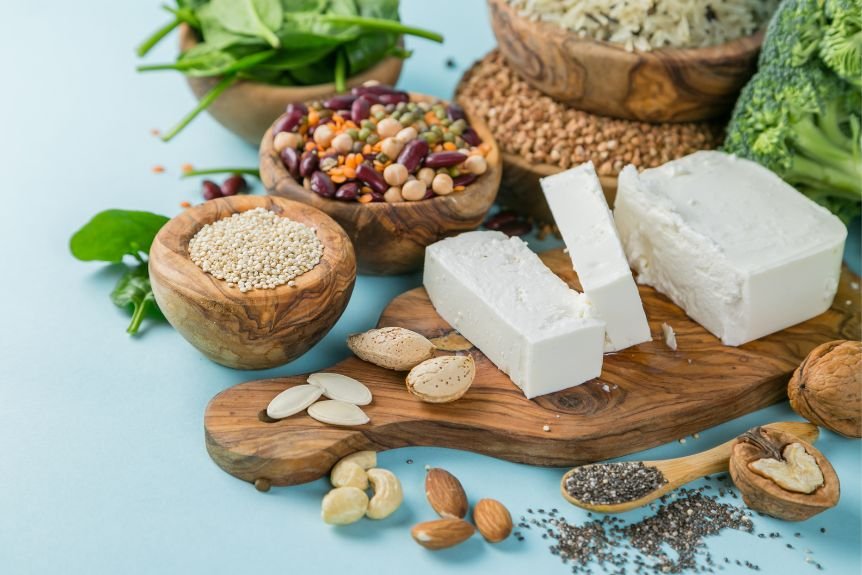
If you're a vegetarian looking to optimize your protein intake, exploring various plant-based options can be a game-changer. From the humble legumes to the powerhouse nuts and seeds, the world of vegetarian protein sources is vast and full of surprises. But what makes these protein sources stand out amidst the plethora of choices? Let's uncover the secrets to maximizing your protein intake while following a vegetarian lifestyle.
Legumes
When looking for a great plant-based protein source, legumes are a fantastic choice due to their high protein content and versatility in cooking. Lentils, chickpeas, black beans, and other legumes aren't only packed with protein but also rich in fiber, vitamins, and minerals. These nutritional powerhouses can be incorporated into various dishes like salads, soups, stews, and even veggie burgers.
In addition to their protein content, legumes are also known for their heart-healthy benefits. They can help lower cholesterol levels, regulate blood sugar, and improve digestive health. By replacing meat with legumes in your meals, you can reduce your saturated fat intake and increase your fiber consumption, which is beneficial for overall health.
To make the most of legumes' protein content, try pairing them with whole grains like quinoa or brown rice. This combination forms a complete protein source, providing your body with all the essential amino acids it needs. Whether you're a vegetarian, vegan, or simply looking to add more plant-based proteins to your diet, legumes are a delicious and nutritious option to consider.
Nuts and Seeds
To further enhance your plant-based protein intake and nutritional profile, exploring the protein-rich options of nuts and seeds can be a flavorful and beneficial addition to your diet. Nuts such as almonds, walnuts, and pistachios aren't only tasty but also packed with protein, healthy fats, fiber, vitamins, and minerals.
Almonds, for instance, offer around 6 grams of protein per ounce, making them a convenient snack to boost your protein intake. Besides, seeds like chia seeds, flaxseeds, and pumpkin seeds are excellent sources of plant-based protein. Chia seeds, known for their omega-3 fatty acids, provide about 4.7 grams of protein per ounce.
Adding these seeds to your smoothies, yogurt, or salads can help increase your protein consumption. Additionally, sunflower seeds are a great option rich in protein, vitamin E, and magnesium. Incorporating a variety of nuts and seeds into your meals can't only improve the taste but also contribute significantly to your protein needs as a vegetarian.
Dairy and Dairy Alternatives
Exploring dairy and its alternatives provides a diverse range of protein-rich options for enhancing your vegetarian diet. Dairy products like Greek yogurt, cottage cheese, and milk are excellent sources of high-quality protein. Greek yogurt, in particular, is packed with protein and can be enjoyed on its own, mixed with fruits, or used as a creamy topping. Cottage cheese is another protein powerhouse that can be eaten alone, paired with fruit, or added to salads for an extra protein boost.
If you're looking for dairy alternatives, options like almond milk, soy milk, and coconut yogurt can also provide a good amount of protein. Almond milk is low in calories and can be a tasty addition to smoothies or cereals. Soy milk is a great source of plant-based protein and works well in coffee or baking. Coconut yogurt, made from coconut milk, is a creamy and delicious alternative to traditional yogurt that can be enjoyed on its own or used in recipes.
Whole Grains
Including whole grains in your vegetarian diet can provide essential nutrients and a good source of plant-based protein. Whole grains such as quinoa, brown rice, oats, and barley aren't only delicious but also packed with protein, fiber, vitamins, and minerals.
Quinoa, for example, is a complete protein containing all nine essential amino acids, making it a valuable addition to your meals. Brown rice is another excellent choice, offering a good amount of protein and fiber to keep you feeling full and satisfied.
Oats are versatile and can be used in a variety of dishes like oatmeal, smoothies, and baked goods, providing a protein boost to your diet. Barley is high in fiber and protein, making it a nutritious option to include in soups, salads, or even as a side dish.




